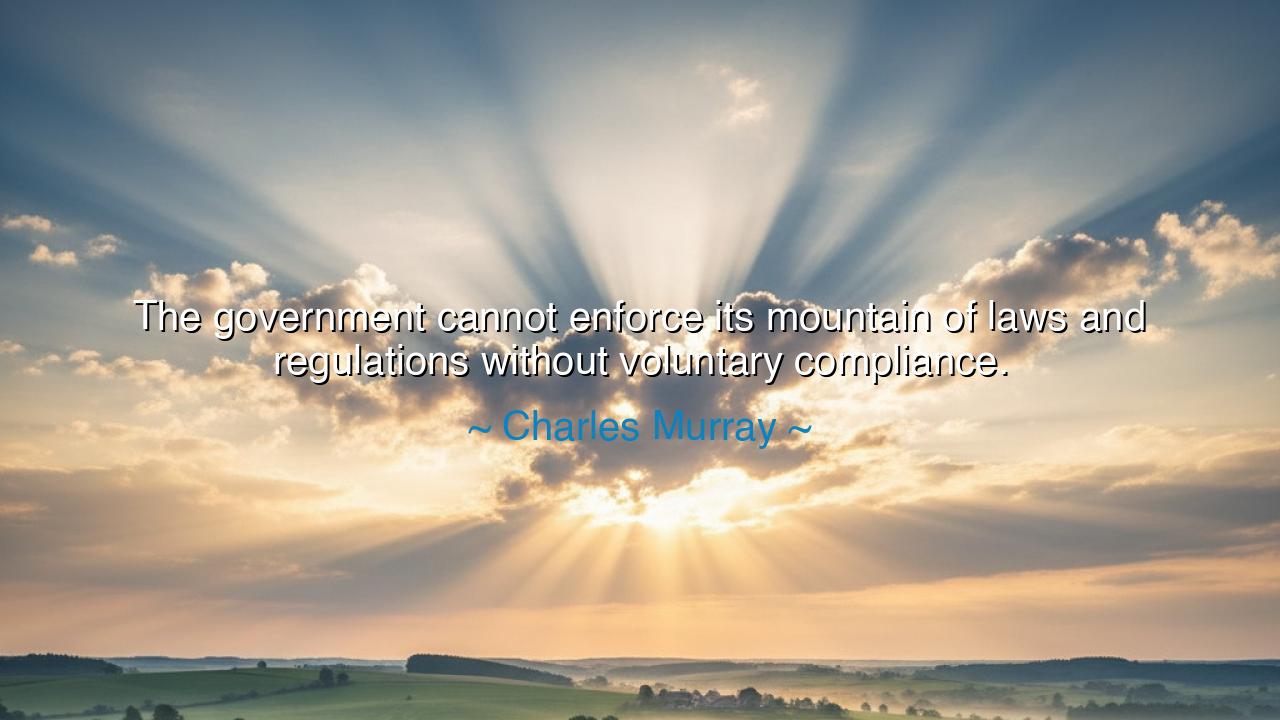
The government cannot enforce its mountain of laws and
The government cannot enforce its mountain of laws and regulations without voluntary compliance.






Hear, O citizens and seekers of truth, the words of Charles Murray, who declared: “The government cannot enforce its mountain of laws and regulations without voluntary compliance.” In this statement lies a profound understanding of civilization itself—a recognition that no matter how vast a nation’s authority, its true strength rests not in coercion, but in consent. Murray, a political thinker and social philosopher, reminds us that law without the trust and cooperation of the governed is but parchment and ink. For the lifeblood of any republic is not its rulers or enforcers, but the willing obedience of its people to principles they themselves hold sacred.
The origin of this quote arises from Murray’s reflections on the modern administrative state—an era when laws multiply and bureaucracies expand beyond count. His words were not written to condemn government, but to reveal a paradox at its heart: that as laws increase, the spirit of voluntary compliance must grow stronger, or the system will collapse beneath its own weight. No government, however powerful, can command every act, police every street, or compel every conscience. It survives only when citizens govern themselves first, out of respect for justice and order.
This truth is not new; it is as old as civilization. Consider the example of Ancient Rome, whose vast empire stretched across continents. For centuries, it was held together not by legions alone, but by the sense of Roman duty and shared law—a voluntary acceptance of Roman order by its citizens. But as corruption grew and civic virtue decayed, the people ceased to obey for the sake of principle. Taxes were evaded, laws ignored, and moral discipline lost. Rome did not fall in a single night—it crumbled because the people ceased to believe in the justice of their own system. Thus, Murray’s warning echoes through time: when citizens no longer trust their rulers, or when laws cease to reflect reason, the thread that binds society begins to tear.
In these words, Murray touches upon a sacred balance—the relationship between freedom and responsibility. For freedom without moral restraint is anarchy, and law without consent is tyranny. When governments multiply rules faster than they cultivate virtue, they forget the foundation upon which authority stands. The state may threaten, punish, and imprison, but it cannot make a people righteous. Only conscience can do that. Hence, the wise understand that good government depends not on the number of its laws, but on the character of its citizens.
We find a vivid modern example in Mahatma Gandhi’s India, where the moral force of voluntary noncooperation shook an empire mightier than any law could restrain. The British ruled by decree, yet Gandhi’s followers, through peaceful refusal, revealed that true power lies in consent freely given—or freely withdrawn. The government, armed with laws and prisons, could not command the obedience of hearts. In this way, Gandhi proved Murray’s insight from the opposite side: when voluntary compliance disappears, even the strongest state becomes powerless.
The lesson, therefore, is both simple and sacred: a nation is governed not merely by law, but by conscience. When citizens respect justice, the government is light upon their shoulders; when they lose faith in its fairness, every law becomes a burden. To preserve liberty, people must obey not out of fear, but from conviction that the law serves truth and common good. This demands integrity from both the rulers and the ruled—for government without virtue invites defiance, and freedom without discipline invites decay.
So let Murray’s words be engraved in the hearts of future generations: that the true strength of a government lies not in its power to punish, but in its ability to inspire obedience through trust. Cultivate honesty in your dealings, respect in your communities, and courage in your convictions. Obey the law not because it commands, but because it is just—and when it ceases to be just, work to reform it through wisdom, not rebellion. For only when conscience and law walk hand in hand can a nation endure.
Thus speaks the wisdom of the ancients, reborn in modern form: that civilization rests upon a fragile, sacred covenant between the people and their laws—a covenant of trust, virtue, and voluntary compliance, without which no empire, however mighty, can stand.






AAdministratorAdministrator
Welcome, honored guests. Please leave a comment, we will respond soon